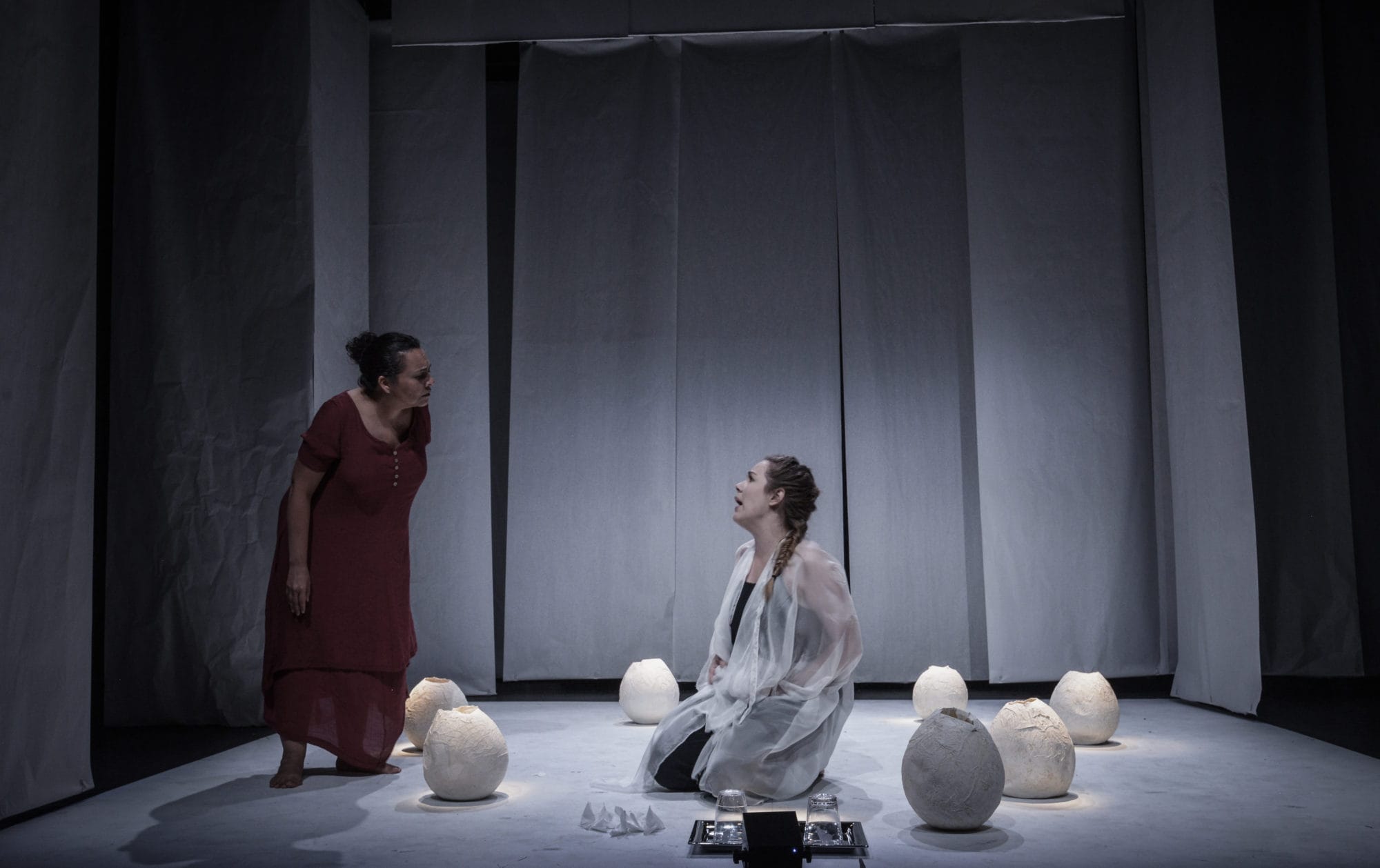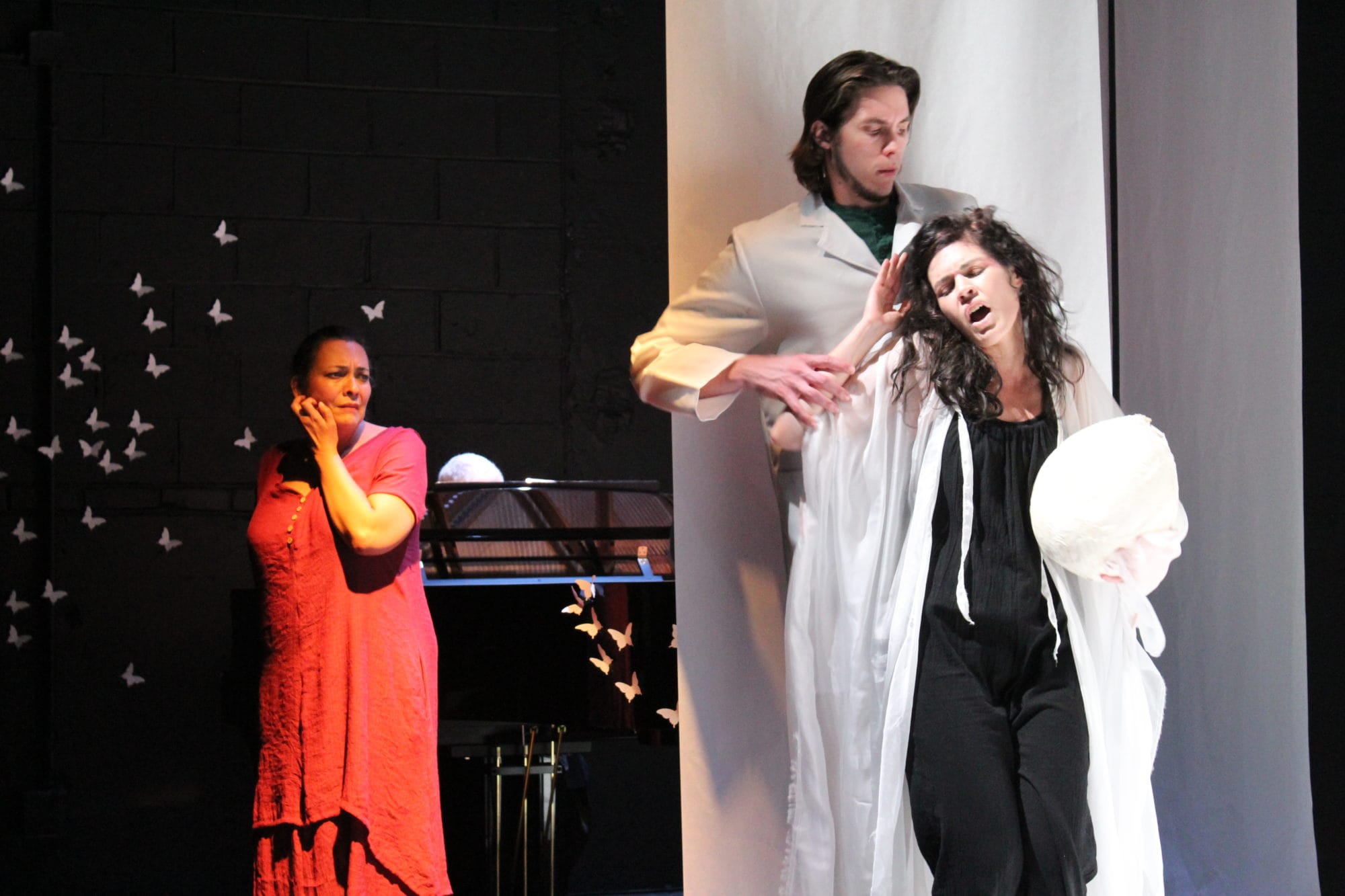While considered one of the classics in opera’s storied canon, Madame Butterfly by Giacomo Puccini is simultaneously acknowledged to be one of the most problematic for its depictions of race and gender. Attempting to rectify these malignant threads of the original libretto and score, is the current production of Butterfly by IN Series at the Source Theater.
A drastic restructuring of the original plot, Butterfly opens in the traditional Act 2 with Madame Butterfly waiting for her husband, Pinkerton, to return from sea after being away for three years. From there the voices of Act 1 are interwoven to haunt Butterfly as the voices in her memories. Surrounded by these shadows of her past while she waits, Butterfly is forced to confront what she believes to be true when it steadily proves to be anything but.

Challenged with navigating this rough thread of extreme emotions was soprano Amanda Palmeiro (Maribeth Diggle for the Italian cast). From the innocence of her memories in Vieni, amor mio! (“Come, my love!”) and the overflowing passion of her complicated love for Pinkerton in Un bel dì vedremo (“One fine day we shall see”), to the heartbreaking despair of Ah! M’ha scordata? (“Ah! He has forgotten me?”), Palmeiro’s soaring tone was an awe-inspiring mixture of tenderness and raw power that shook me to my core.
Looking helplessly as Butterfly wasted away from waiting was her faithful friend and caretaker, Suzuki, played by mezzo-soprano Elizabeth Mondragon. Troubled by the delirium unfolding, Suzuki has to choose how best to help her dear friend. For me, a standout moment came near the work’s conclusion when, desperately wanting a renewal of what was once a lively and vibrant friendship, Suzuki joins in to help prepare the house for Pinkerton’s fictional return in Tutti i fior? (“All the flowers?”). A stunning duet with Butterfly, their rich tones locked together beautifully, mirroring the strength and devotion of their friendship that had kept Suzuki by Butterfly’s side all these years.
Flitting in and out of the paper paneled stage were Sharpless, played by baritone Erik Grendahl, and Pinkerton, played by tenor Brian Arreola (Nelson Ebo in the Italian cast). Rougher and crasser than the friendship seen between Butterfly and Suzuki, these two boisterous voices mocked and bantered in Yamadori, ancor le pene (“Yamadori, are you not yet…”) establishing them as self-serving and entitled men. At the same time the reworking of Sharpless’ returning as that of a Doctor in Io so che sue dolore (“I know that her pain”) and Pinkerton’s returning in Addio, fiorito asil (“Farewell, flowery refuge”) as a memory, restored the focus of this new narrative back to Butterfly herself.
Timothy Nelson’s direction played with time, space, light, sound, and movement in thought-provoking ways to create a visually stunning and arresting production. Using simple sheets of white butcher paper hanging from the ceiling in panels, Scenic Design by Jonathan Robertson created the effect of a small white box within which Butterfly kept her vigil and on which shadows were cast representing the friends and family of her past by Marianne Meadows’ Lighting Design. The parts of the entire orchestra were placed into the capable and dexterous hands of Music Director/Pianist, Jessica Krash. And the Costume Design by Donna Breslin balanced beautifully between simple and suggestive in a way that enhanced the drama unfolding.

This reimagining of Butterfly by IN Series, a company known for removing the distance between its works and its audiences with small opera, is an earnest attempt to resolve the show’s underlying issues of race and gender, and looks at what happens when you strip back a life into waiting, watching, and remembering/imagining. By removing some of the harmful melodrama of the original piece and replacing it with the frantic uncertainty of mental fragility when faced with trauma, we are able to begin peeling off the injuries of the past and move to the future with hope. While I was personally able to disassociate this rendition from the original’s damaging themes, the vehicle for valuable dialogue that is provided in this production is perhaps its most important impact. It is through discussions such as these and honest attempts like the one central to Butterfly by IN Series that we as lovers of this art form can look at the dramatic, human tragedy at this piece’s core in a new light.
For those who would like a deeper discussion into race and gender in opera, IN Series is holding two panel discussions to thoughtfully explore the implications of both in the art form (September 9th on race and September 16th on gender).
Running Time: 80 minutes, with no intermission.
Butterfly, presented by IN Series, is playing through September 22nd at the SOURCE Theater – 1835 14th Street NW, Washington, DC. For tickets, call the box office at (202) 204-7763, or purchase them online.
Note: Select performances are sung in Italian with English supertitles, and select performances are sung in English.




